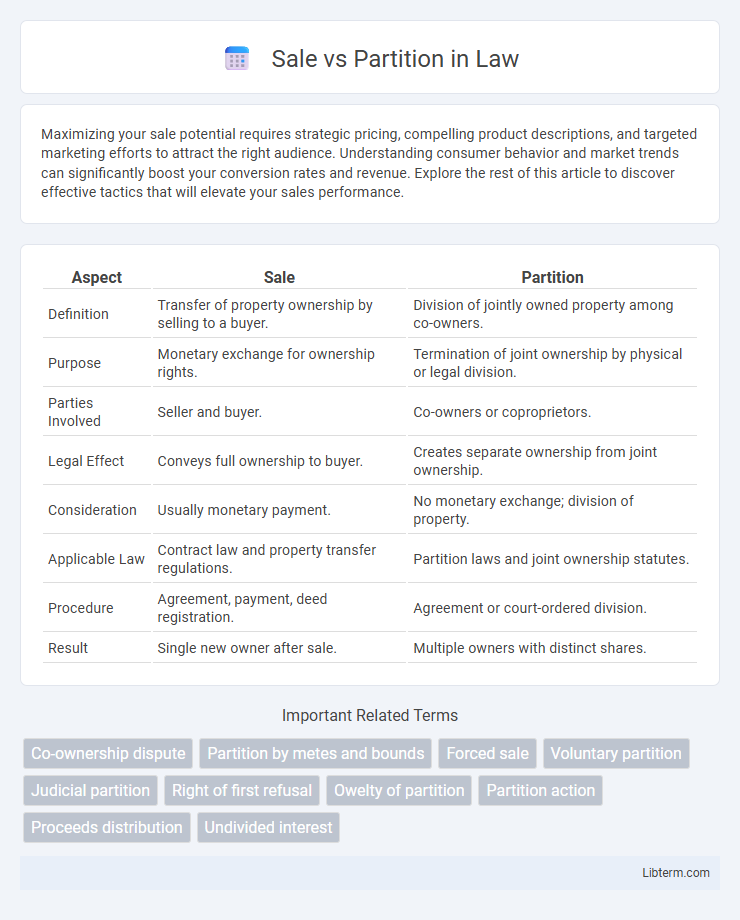Maximizing your sale potential requires strategic pricing, compelling product descriptions, and targeted marketing efforts to attract the right audience. Understanding consumer behavior and market trends can significantly boost your conversion rates and revenue. Explore the rest of this article to discover effective tactics that will elevate your sales performance.
Table of Comparison
| Aspect | Sale | Partition |
|---|---|---|
| Definition | Transfer of property ownership by selling to a buyer. | Division of jointly owned property among co-owners. |
| Purpose | Monetary exchange for ownership rights. | Termination of joint ownership by physical or legal division. |
| Parties Involved | Seller and buyer. | Co-owners or coproprietors. |
| Legal Effect | Conveys full ownership to buyer. | Creates separate ownership from joint ownership. |
| Consideration | Usually monetary payment. | No monetary exchange; division of property. |
| Applicable Law | Contract law and property transfer regulations. | Partition laws and joint ownership statutes. |
| Procedure | Agreement, payment, deed registration. | Agreement or court-ordered division. |
| Result | Single new owner after sale. | Multiple owners with distinct shares. |
Understanding Sale and Partition: Key Differences
Sale involves transferring ownership of property from one party to another for monetary consideration, resulting in a complete change of title. Partition refers to dividing jointly owned property among co-owners, either physically or by sale, to terminate the co-ownership. Understanding these distinctions is crucial for legal clarity in property disputes and ownership rights.
Legal Definitions of Sale and Partition
Sale refers to the legal transfer of ownership of property from one party to another in exchange for a monetary consideration, creating a new owner with full rights. Partition is a legal remedy used to divide jointly owned property into distinct portions, allowing co-owners to terminate their joint ownership interests without transferring ownership to outsiders. Both concepts address property rights but differ as sale creates a new ownership title, whereas partition reorganizes existing ownership among current owners.
Common Scenarios for Sale vs Partition
Sale involves selling jointly owned property to a third party with proceeds divided among owners, commonly used when co-owners cannot agree on property use or division. Partition refers to legally dividing property into individual shares, often preferred when physical division is feasible without greatly reducing value. Common scenarios for sale include disputes requiring liquidation of property, while partition suits situations where owners seek clear ownership boundaries or wish to retain their individual portions.
Advantages of Selling Property
Selling property provides immediate liquidity, allowing owners to access the full market value of the asset without delays associated with legal disputes or court approvals. The sale process simplifies ownership transfer, reducing potential conflicts among co-owners compared to partition actions that may involve dividing property physically or legally. Financial flexibility gained from a sale enables reinvestment opportunities or debt settlement, offering a practical advantage over the complexities and time consumption of partitioning property.
Benefits of Partitioning Property
Partitioning property allows co-owners to divide real estate into individually owned portions, preserving each party's interest without forcing a sale. This process helps maintain control over specific property shares, potentially enhancing investment value and avoiding the distress or financial loss associated with a forced sale. Partitioning also facilitates tailored development or usage plans for each divided parcel, increasing flexibility and long-term asset appreciation.
Legal Procedures for Sale
Legal procedures for sale involve executing a valid sale deed, registering the property with the appropriate government authority, and ensuring clear title transfer to the buyer according to local property laws. The process includes obtaining necessary approvals, paying applicable taxes like stamp duty and capital gains tax, and adhering to contractual obligations outlined in the sale agreement. Compliance with these legal steps safeguards the transaction's validity and protects both parties' interests during the property sale.
Legal Process of Partition
The legal process of partition involves a court-ordered division of jointly owned property into individual shares, enabling co-owners to hold separate titles. This process requires filing a partition suit in the appropriate jurisdiction, where the court assesses the property's nature, ownership rights, and suitability for physical division or sale. Legal partition ensures equitable distribution while protecting co-owners' rights, contrasting with a sale that transfers ownership entirely to a buyer.
Financial Implications: Sale vs Partition
Sale of property typically results in immediate liquidity by converting real estate assets into cash, often subject to capital gains tax, impacting overall financial returns. Partition, while allowing co-owners to divide and retain physical assets, may involve legal fees, potential disputes, and diminished market value due to division complexities. Financial implications hinge on factors like tax liabilities, transaction costs, and long-term investment goals, making sale a more straightforward monetization method compared to the potentially fragmented equity outcome in partition.
Resolving Disputes: Sale or Partition?
Resolving disputes in property ownership often involves choosing between sale and partition, where sale converts the property into money to be distributed among co-owners, while partition divides the property itself. Sale typically offers a quicker resolution by liquidating the asset, useful when physical division is impractical or contentious. Partition suits cases where co-owners prefer retaining ownership of distinct portions, though it may involve complex boundary determinations and potential value disparities.
Choosing the Best Option: Factors to Consider
Choosing between sale and partition involves evaluating property value, legal costs, and time efficiency. Sale offers quick liquidation, ideal when parties seek cash distribution, while partition divides property ownership, suitable for preserving assets or resolving disputes. Consider factors like market conditions, co-owner relationships, and potential proceeds to determine the most beneficial approach.
Sale Infographic

 libterm.com
libterm.com